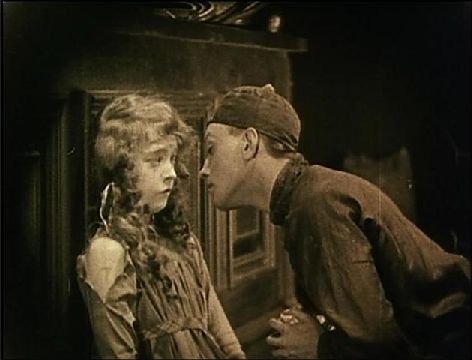Broken Blossoms (1919) 

Director: D W Griffith
Cast: Lillian Gish, Richard Barthelmess, Donald Crisp
Synopsis: A frail waif, abused by her brutal boxer father in London’s seedy Limehouse District, is befriended by a sensitive Chinese immigrant with tragic consequences.
Turning away from the epic scale of his quintessential movies, Birth of a Nation and Intolerance, director D. W. Griffith turned to an altogether smaller and more intimate story with Broken Blossoms in 1919. Instead of telling a vast tale spanning millennia and featuring a cast of thousands, he focused his attention on the tragic interplay between just three people: a Chinese immigrant to London (Richard Barthelmess), a young waif with whom he develops a brief but touching relationship (Lillian Gish), and her brutish father (Donald Crisp). It’s been suggested this was another sop by Griffith to those who had accused him of being a racist due to the content of BoaN although, while Bathelmess’ Chinese immigrant is a completely sympathetic character, the thoughtless racist attitudes that were commonplace back then are still very much in evidence. For example, the movie’s secondary title is ‘The Yellow Man and the Girl’, and during a tender love scene, Gish’s Lucy says to him: “Why are you so good to me, Chinky?” — which tends to break the mood just a tad.
Griffith’s trademark use of tiny gestures and changes of expression is very much in evidence in the performances of Barthelmess and Gish, while Crisp, who is barely recognisable as the kindly patriarch of countless 40s flicks, paints a broader picture of the loutish Battling Burrows. This counterpoint between screen father and daughter works well, stressing the fragile nature of Gish’s waif, while emphasising the misery of her dependence upon her uncouth father. Barthelmess, meanwhile, spends much of his time gazing miserably at the bleakness of the world around him as his character tries to lose himself in a haze of opium after failing to spread the word of peace. Chen seems to be moving through a dream for much of the film, passively allowing himself to be buffered by the world, and only shaking himself from his torpor when Lucy almost literally falls at his feet. This scene, in which Lucy and Chen first meet, is wonderfully atmospheric and beautifully framed and is, strangely, the prelude to the film’s weakest segment. Having set the scene beautifully and created a great atmosphere, Griffith allows proceedings to slip into melodrama. While Battling’s discovery of Lucy’s new friendship is melodrama of the most Victorian kind, the relationship between the two potential lovers goes nowhere which, while perhaps true to the film’s title, leaves the story struggling for momentum. Lucy enjoys a few hours of being spoiled by Chen — the first time in her life that she ever has been, but there is very little interaction between them, and Chen’s apparent consideration of forcing himself on Lucy before finally kissing her sleeve really doesn’t ring true at all. In fact, the scene looks as if it were added almost as an afterthought to inject a little suspense.
Nevertheless, Broken Blossoms is another example of one of the world’s greatest directors operating at somewhere close to the top of his game. In another few years, Griffith’s Victorian viewpoint would look horribly outdated to the Roaring Twenties crowd. There were still more classics to come, but in terms of technical and creative accomplishment he had already peaked.
(Reviewed 20th January 2007)
httpv://www.youtube.com/watch?v=ZdIiZzc0Ceo
